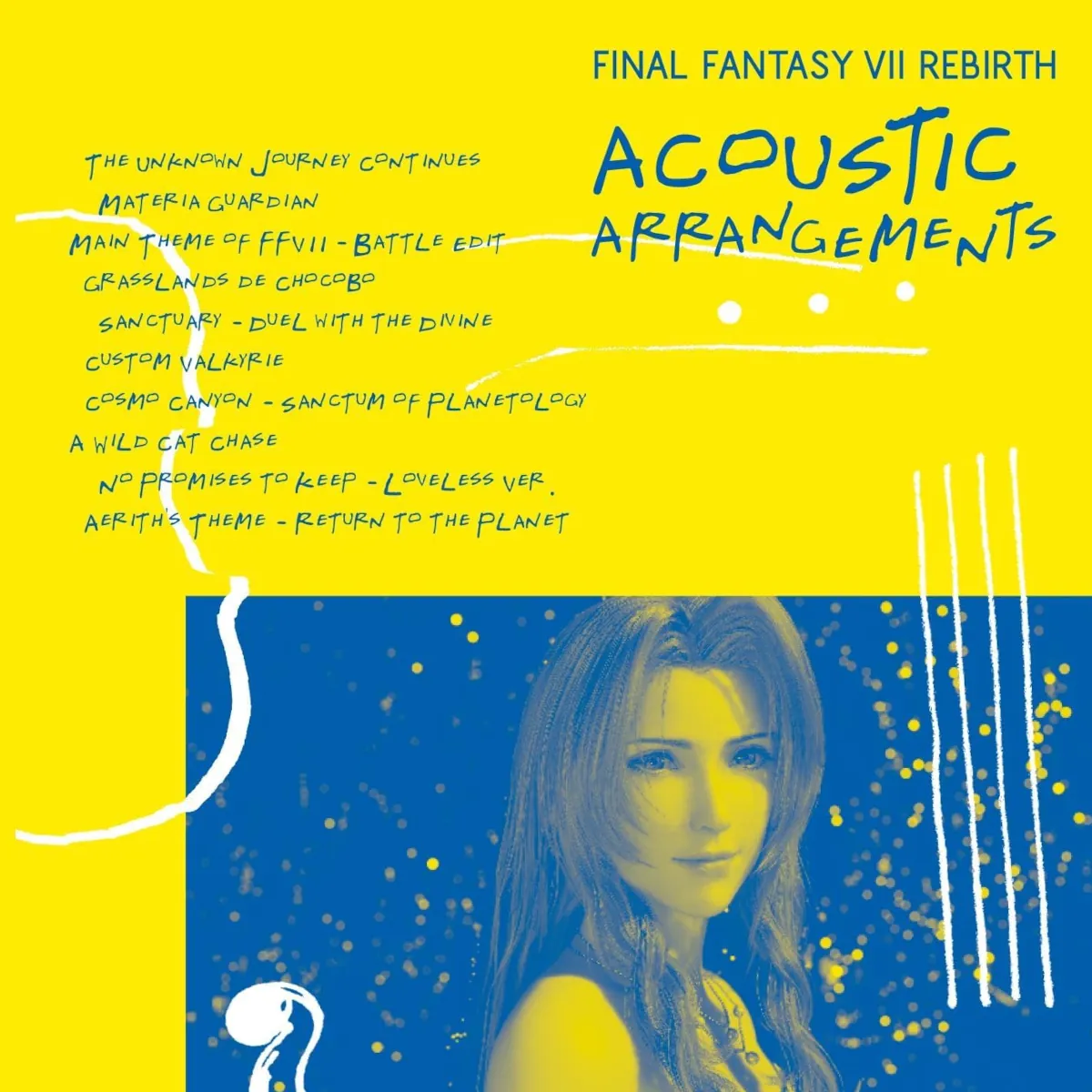The heavy-hearted PSOne synths of Nobuo Uematsu’s score for Final Fantasy VII (1997) have been arranged and reinterpreted officially and by fans more times than any game in our coverage, barring perhaps The Legend of Zelda. Among the many, many versions of FFVII‘s iconic soundtrack, 2020’s Final Fantasy VII Remake Acoustic Arrangements (coinciding with the release of FFVII Remake and its 180 orchestral tracks!) featured some of the cleanest, most intimate interpretations of my beloved favourites that I’d ever heard. Well, lightning can strike, erm, thirty times (no, not you, FFXIII)! Released March 12, 2025, a year after FFVII Rebirth, Final Fantasy VII Rebirth Acoustic Arrangements is exuberantly performed and breathes new life into Uematsu’s compositions while letting new music from younger composers dazzle.
Admittedly, this album came so hot on the heels of Rebirth’s OST and the Orchestra World Tour Live album that the samey opening tracks exhausted me at first. Five of the ten songs here feature in that Live album, including opener “The Unknown Journey Continues,” which runs through iconic clips from “One Winged Angel,” “Opening – Bombing Mission,” and the original overworld’s “Main Theme.” It’s blisteringly played by a squad of strings and a piano, but not all that different (or sonically stripped down) from the orchestral version. Following this is boss theme “Materia Guardian” (containing classic battle theme “Let the Battles Begin!”) and “Main Theme of FFVII – Battle Edit,” both of which have been heard countless times by any FFVII fan. They’re great, but I wish Square Enix had balanced the battle themes throughout the album rather than use three haymakers to frontload what turns out to be a very genteel, lovely record.
“Grasslands de Chocobo” is fun and frenetic, and I love the play between the flute and the deep cello beneath. It does incorporate elements of the “Main Theme” again, which is another odd layout choice considering its role in the previous track. Next, “Sanctuary – Duel with the Divine” absolutely floored me. This summon material battle theme is the first track on the album not to feature Uematsu’s compositions. It very much stands out on Rebirth Acoustic, particularly the break in the middle when the piano sends off a soaring violin solo backed by cajón percussion. “Custom Valkyrie,” arranged by the album’s lead violinist Atsuki Yoshida, breathlessly passes solos from instrument to instrument in a way that reminded me of Final Fantasy XIII-2’s “Full Speed Ahead.”
Fan-favourite “Cosmo Canyon – Sanctum of Planetology” at last accomplishes the Latin American inspiration Uematsu strove for, and leads with a show-stealing bass clarinet. Shifty, stealthy track “A Wild Cat Chase” playfully cleanses the palate for the showstopper, “No Promises to Keep – Loveless Ver.,” a truncated, lyricless take on Rebirth’s ending theme composed by Uematsu. The forlorn bandoneon accordion supported by the contrabass and string swells would be right at home in Joe Hisaishi‘s score for Kiki’s Delivery Service. It’s the equivalent of a musical sigh, full of pathos and reminiscing, and makes for a perfect companion piece to album closer “Aerith’s Theme – Return to the Planet.” This song has been closing every Rebirth album lately, and I’ve come to love the choirs integrated in other versions. Here, however, there’s a more intimate, bittersweet tone that’s faithful to the PSOne original while also fitting the close-proximity chamber music feel of the previous Remake Acoustic album.
Not a single weak track appears on Final Fantasy VII Rebirth Acoustic Arrangements, though the whole package could be better balanced. Some interpretations of FFVII classics dethrone my old favourites while never overshadowing what is truly some of the best new music Square Enix has produced this generation. If you’re ready for more high-quality FFVII arrangements, the album is available for purchase through Square Enix’s official store.





